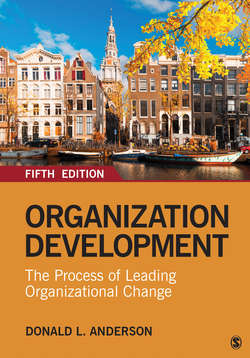Читать книгу Organization Development - Donald L. Anderson - Страница 49
На сайте Литреса книга снята с продажи.
Why Are Values Important to the OD Practitioner?
ОглавлениеValues are significant for organization development because they are the underlying beliefs that are enduring and broader than any single consulting engagement or intervention. Values have been a part of the field since its founding, and they have held such an important place in the practice of OD that the field has been somewhat derisively referred to as a “religious movement” (Harvey, 1974). Yet failing to take values into account leaves OD as a list of intervention techniques to be studied without understanding the reasons why those interventions were developed or when the practitioner should apply them. Management scholar Edgar Schein (1990a) wrote of his frustration in completing a questionnaire about OD intervention techniques that “I did not see OD as a set of techniques at all, but as a philosophy or attitude toward how one can best work with organizations” (p. 13). Margulies and Raia (1990) put the point more bluntly, noting that OD
is value-based and more importantly its core values provide the guiding light for both the OD process and its technology. The very identity of the field is reflected in the existence and application of the values it advocates. Without them, OD represents nothing more than a set of techniques. (p. 39)
Others agree, going so far as to predict that the future of OD rests on the applicability of its core values to practitioners and clients (Wooten & White, 1999).
Values are important to OD practitioners for the following reasons:
1. They guide choices about how to proceed. Returning to our values helps to guide us when we are uncertain how to proceed with a client or when we have multiple courses of action that are possible. When a client does not know which solution is best, for example, the OD value of participation and involvement may encourage the practitioner to recommend including organization members in the decision about which solution is most desirable. OD values can give direction and tend to specify guiding principles rather than exact behavior.
2. They provide a larger vision that extends beyond any individual intervention. For the OD practitioner, values provide a constancy of purpose that is greater than any single consulting engagement, providing a larger mission for one’s career. Many OD practitioners hold values of environmental and social responsibility and social justice, and they see results in those areas as enduring effects of their work. Developing better working conditions in more humanistic and democratic organizations is an overarching value that many practitioners hold, core beliefs that endure regardless of the situation.
3. They distinguish OD from other methods of consulting and change. OD and other types of management consulting share important similarities but also important differences. One of these differences relates to the values of OD work. Focusing interventions and the consulting process to ensure growth, development, and learning is a key value that does not show up as a purpose of most other management consulting activities. “It is the humanistic value structure and concern for people that differentiates organization development from many of its competing disciplines” (Church, Hurley, & Burke, 1992, p. 14).
4. They can help to prompt dialogue and clarify positions. Being explicit about our values and the choices they prompt can help OD practitioners and clients understand one another’s behavior. The OD practitioner can explain why he or she believes in a certain course of action by articulating the values underlying this choice, and the manager or client can do the same. We can learn from one another’s perspectives and discover underlying similarities and differences (as well as avoid repeating the same conflicts over and over). A client who decides not to implement a mentoring program may still believe in the value of individual growth and shared learning, but may believe that the time is not right for this particular program. The consultant can then work with the client to develop another program that meets the client’s needs and also maintains the same objectives and underlying values.
5. They can help us evaluate how we did. Values can be a starting point for evaluation of an engagement (as we will discover in Chapter 14) or a point for personal reflection and self-evaluation as a consultant. Whether we acted in accordance with our values and helped to further those values is an important point of learning and evaluation after any engagement.
